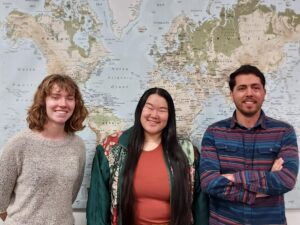Staff Spotlight: Legal Assistants
3/29/24
Meet our Legal Assistants Sarah (SC), Sammi (SM), and Qahar (QB)! Our Legal Assistants help our Legal team run efficiently and ensure that client needs are being met. We are so grateful for all their hard work and dedication! We asked the team a few questions so you can learn more about them, and the work they do at Exodus.

- Tell us a little about yourself.
SC: My name is Sarah, I’ve worked at Exodus for about 2.5 years.
SM: My name is Sammi, and I am one of the legal assistants here on the legal team. I have been working at Exodus for a little over a year and a half. I graduated from Indiana University-Bloomington with majors in International Law and Spanish Linguistics and a minor in Political Science.
QB: My name is Abdul Qahar Behzad, I’m from Afghanistan, and I moved to the United States in August 2021 during the Operation Allies Welcome. I graduated with a degree in Law and Political Science from Rana University in Kabul, Afghanistan in 2020. I am also a Professional Artist with 20 years of related work experience. My website is www.qaharbehzad.com
- What are some of your responsibilities as a Legal Assistant?
SC: I help the attorneys schedule appointments, manage communication with clients, and assemble client’s applications. I am also responsible for preparing and submitting family reunification applications for clients through the Central American Minors program. I also received my partial DOJ Accreditation last year, so I am now able to represent clients on certain types of applications and interviews in front of USCIS (United States Citizenship and Immigration Services).
SM: As a legal assistant, I work to support the attorneys with whatever they may need. The legal assistants are also accredited by the Department of Justice to practice immigration law on a limited basis. This means that we also can meet with clients and help them complete their immigration forms such as green cards, work permits, family reunification, and most recently, citizenship. I also oversee our undergraduate legal interns and volunteer attorneys who work with the legal team as well.
QB: My primary job is to support and facilitate the work of attorneys in the office. A lot of my work responsibilities are based on facilitating communication between the legal team and clients. Some of the responsibilities include: serving as a primary point of contact for most of our Afghan clients, scheduling appointments for the attorneys to meet with clients, intakes, include notifying and reminding clients, submitting immigration applications, updating documents and following up with clients to give them updates and instructions, book interpreters, helping clients schedule medical and vaccination appointments, sharing resources with our clients that are more affordable and accessible, and additionally I arrange transportation to and from appointments for clients when needed. I also help translate documents in Dari and Pashto to English (such as marriage certificates, National Afghan IDs, Statements, etc.), and help attorneys and other Exodus staff by interpreting for Afghan clients in Dari and Pashto.
- How did you hear about Exodus and why did you want to get involved?
SC: I found Exodus online; I had finished a year as a volunteer at a migrant shelter on the US/Mexico border, and I was looking for jobs to continue working with migrants and refugees. Some of the best things about Exodus are that the staff and clients come from all over the world, that Exodus offers a huge variety of services, and that client self-sufficiency is a priority.
SM: I originally started at Exodus as the LCORE intern while I was still in undergrad. I knew I wanted to work with immigrants and refugees after I graduated, so continuing to work with Exodus was a logical choice. When the legal assistant position opened up, it was a natural fit as I also have an interest in immigration law.
QB: Since I moved to Indiana I have been working with other refugees and asylees to help them navigate their resettlement. Very shortly after I settled in Indianapolis, I was visiting some Afghan community members who had also very recently settled here, and my friends and I brought them a meal. While I was there, one of them received a call, and couldn’t communicate so he asked me to help. I interpreted the conversation for them over the phone. As soon as the conversation ended, the person on the other line introduced herself and asked if I would be interested in working with them. That person was Megan Hochbein, the Senior Director of Operations at Exodus. She told me to visit Exodus’s website and send my resume. Later, I passed the interview and was selected to join as a Case Aide. I was later promoted to legal assistant.
- What’s one thing you wish more people knew about refugees and other forcibly displaced populations?
SC: Migration is really about finding stability. Without a safe and stable place to call home, it is nearly impossible to grow and flourish. Our job as a refugee resettlement agency is to help our clients find stability in the United States. That looks like a safe place to live, a job to support themselves with, a school for their children to get reliable education, English classes so they can ask for help when needed and join the community, legal status and legal permission to work, etc. As our clients find stability in the US, we have the privilege of seeing them achieve goals they previously thought impossible.
SM: When many of our clients arrive to us, they are often leaving loved ones behind because of the immigration systems currently in place. Family reunification processes take a very long time, often years, to come to fruition, so our clients are often very anxious and worried about their loved ones who are back home. Being reunified with family and friends is the ultimate goal and I am glad to be part of the process to do that.
QB: There is so much to talk about what an immigrant experiences when they are displaced from their home country. Even for myself, considering that I have traveled to many other countries and worked for over 10 years with the U.S. international forces in Afghanistan, it was not easy. I left everything behind and started from zero. It takes a lot of courage to be away from your family, friends, community, and homeland and leave everything behind. It is a journey that we experience the harsh differences of culture, language, religion, and race, and sometimes prejudice because of those differences.
- Any favorite memories/moments from working at Exodus that you’d like to share?
SC: One of my favorite parts of my job is giving clients their documents (work permits, green cards, etc.) after their case has been approved. More than once, a client was so excited to receive their green card that they asked for a hug. The wait times for these documents vary from months to years, and having a case approved can have a significant impact on clients’ lives, so receiving these documents is definitely a moment to be celebrated!
SM: I think it’s wonderful to be able to work with clients on getting their green cards, work permits, or citizenship. It is always a joyous occasion and I have laughed, hugged, danced, and cried happy tears with clients when they’re handed their new green card or work permit. Being a part of legal wins and seeing families reunify with loved ones at the airport pick-ups just serves as a reminder of why we do the work that we do here at Exodus.
QB: There are so many moments to talk about to talk about, I feel happy and satisfied when I make time to listen to our clients and other people in the community with their concerns and help and connect them with resources they need. I’m happy when I hear back that their concern was resolved and hearing them say “Thank you” is such a blessing, and is the biggest reason I continue my work at Exodus.
- What language(s) do you speak?
SC: I speak English and Spanish.
SM: I speak English and Spanish.
QB: I speak Dari, Pashto, Persian, Urdu, and English.

